The players and the game
"Those who have been angry about all this – don’t investigate the people, investigate the system." (Robert Florence, writing on John Walker's blog last week.)
Let's see what we can do, eh?
To understand the events last week which opened a can of worms in the world of videogames journalism on a perhaps unprecedented scale, we need to look at the people and organisations involved. Only by painting as full a picture as possible of the entire culture of the games industry do we have a hope of seeing how it works.
But let's start off by examining the cast of participants in this particular drama and then try to figure out where we can get to from there.
—————————————————————————————————————
INTENT MEDIA
Intent Media is the publisher of games trade weekly MCV, and the organisers of the GMA awards. (It also owns 18 other trade newspapers and runs many other events.)
STUART DINSEY
Dinsey is the founder, managing director and 67% controlling shareholder of Intent Media. He's been involved in the games industry trade press for over 20 years, and has carved himself out a very sizeable empire. A former editor of now-defunct trade paper CTW, he drove it out of business with MCV and cornered the market for himself. He's the only person at Intent Media with the ultimate authority to launch a potentially-expensive court case for libel.
MICHAEL FRENCH
French is the Editor-in-Chief at Intent's games-industry titles MCV and Develop. He tweeted that "there was no legal action by Intent" over the Wainwright affair, but despite numerous questions has, at the time of writing, refused to clarify whether any was threatened.
LAUREN WAINWRIGHT
Heavens, where to begin? A low-ranking employee of Intent, where she works as a Staff Writer for MCV. Wainwright's actions over the last week have been extensively documented on the internet, and we do mean extensively. Since initially complaining about Florence's article, she's locked her Twitter account, deleted critical comments, edited her Journalisted page to remove her own claims about working for Square Enix, and removed her LinkedIn profile, including the Google cached version. A retrieved version of it can be read here.
We can only guess about the reason for the removal of the profile, but the only "incriminating" part would appear at first glance to be the entry where Wainwright describes herself as a "Video Games Consultant (Freelance)".
She describes the function of such a person as to "Produce mock reviews in house and inform video game publishers of potential critical reception and community reaction to their products." She helpfully gives the dates for this occupation as "November 2011 – present (1 year)", which appears to clearly identify it as a current job, despite her full-time position at Intent.
Wainwright's deleted LinkedIn page also, until yesterday, claimed she was a current freelancer for CBS Interactive (writing for Gamespot), News International (writing for The Sun) and others. We know from the revelations of last week that she's reviewed numerous Square Enix titles for the Murdoch-owned newspaper, and that the only company she's known to have done "consultancy" work for is Square Enix.
EUROGAMER NETWORK LTD
ENL is the publisher of a worldwide series of gaming websites, reaching over 10 million unique users every month, and the organisers of public events like the Eurogamer Expo. Affiliated to various other sites through an advertising arrangement, including news site VG24/7 and PC games site Rock, Paper, Shotgun.
RUPERT LOMAN
Secretive founder, owner and Managing Director of ENL since the network's creation in 1999. Has made absolutely no explicit comment about the incident, with the possible exception of one ambiguous tweet reading "Just ate a pulled pork sandwich so tasty it almost made me forget about all the absolute bullshit in my inbox today. Almost."
TOM BRAMWELL
"Operations Director" and "Editor-at-large" at ENL. The decision to censor Florence's column could only have been made by either Bramwell or Rupert Loman. Eurogamer's amended page containing Florence's column stated that "Following receipt of a complaint from Lauren Wainwright, Eurogamer has removed part of this article".
Speaking to Penny Arcade, however, Bramwell claimed that "Lauren told us that she intended to pursue the matter with her lawyers and made it clear she would not drop it until it was resolved to her satisfaction".
—————————————————————————————————————
At this point, we run out of certain public knowledge about Intent and Eurogamer, and can only speculate. However, it's probably safe to say that despite boasting of her "media law module" in a tweet at the beginning of the controversy, Wainwright would lack the resources to pursue a libel case without the backing of her employer, as it's one of the most notoriously expensive actions to bring to a British court.
That fact appears to leave us with only one plausible conclusion. Eurogamer's own Operations Director has explicitly said there was a legal threat (something he's reiterated in a statement today just minutes before we were about to publish this post), despite the website having previously only admitted to changing the piece after a "complaint". Given the vast costs of a libel case, it seems hugely unlikely that experienced professionals such as Bramwell or Loman would treat as credible a threat from a lowly staff writer like Wainwright on her own. Therefore, we must assume that the "lawyers" mentioned by Bramwell would have been those of Intent Media.
As previously noted, the extremely high costs involved in a libel action seem far outwith the probable authority of Michael French. Therefore, it seems inescapable that Stuart Dinsey threatened to bring the considerable financial muscle of Intent Media to bear on Eurogamer Network Limited, and Eurogamer – either in the form of Bramwell or Loman – caved in under the pressure and ordered the censorship of Florence's article, leading to his resignation.
So that's the small picture. But how did we get to such a position? And why would Intent take the risk – even a small one – of having its bluff called and being forced into a cripplingly expensive and damaging court case it would have no realistic hope of winning? (Because for all the many flaws of English libel law, Wainwright's case was paper-thin at best. Florence's comments about her were innocuous, heavily-qualified and based on her own public comments.)
Once again, we can only speculate. But it's clearly in the interests of Intent for the relationship between videogame publishers and videogame media to be a cosy one – such a situation is one of the openly-stated goals of the Games Media Awards, in which PR executives of games publishers still vote to give games journalists enhanced public profiles.
If nobody rocks the boat, games publishers make plenty of money and advertise in Intent's trade publications, providing the vast bulk of its income. (As MCV was given away free for the first several years of its life it's possible to make fairly secure assumptions about its business model.)
But the publishers have to play their part in keeping the boat steady too, which is why non-compliant behaviour from the videogaming press often results in retribution. Experienced games journalist Justin Amirkhani got in touch with Wings Over Sealand to reveal the reality of his years in the industry:
"I can't claim to be completely innocent of the muddy waters (I worked for a year as Microsoft's Xbox.ca community blogger), but holy shit you hit the nail on the head. I feel so grateful now to live in a time where I can crowd-fund my work, taking [away] the need to pander to advertisers, cooperate with PR people, and bend over backwards for anyone but my readers to make a story happen.
I've been through it all; had review scores changed by editors, had reviews pulled when PR put pressure on the outlet, even been fired from one job because I got blacklisted for being negative about a game we'd been given special access to. This industry may be pixel perfect on the outside, but I encourage everyone, reader or journalist, to seriously think about what's being written, and more importantly why."
Such pressures are usually kept behind the scenes, but occasionally they leak out into public view. Let's quickly take a look at a few examples.
ELECTRONIC ARTS
SQUARE ENIX
In one of the most famous controversies over reviewer intimidation, Gamespot editorial director Jeff Gerstmann was fired over his review of the publisher's title Kane And Lynch.
ACTIVISION
Blacklisted a games website, withholding all review materials, invitations and co-operation, after the site published a news piece which hadn't been officially approved by the company. Or in other words, for practicing what might be called actual journalism.
2K GAMES
Employed a PR company who threatened to withhold co-operation from sites that had published negative reviews of the widely-slated Duke Nukem Forever. Reporting the story, respected tech-news site Ars Technica noted that such "blacklists are common, but rarely public".
But PR, of course, prefers as a rule to employ the carrot rather than the stick. Marvel at the hospitality lavished, for example, on a pretty minor website during this randomly-chosen but not untypical press trip, and the subtle pressures accompanying it. (Emphases added.)
"For us fans of Hellgate, having spent the three prior years in a closely knit community that spanned several fansites and several continents, the chance for us to finally meet up in person was an opportunity that none of us wanted to pass up.
Having flown a distance of 8,000 miles in 26 hours, I should have felt fatigued by the trip, but my excitement kept me awake and energized across the three days I spent in San Francisco.
We stayed at the Marriott in SOMA, close to Flagship’s offices which was across the San Francisco Giants ballpark. Having gotten our room keys and completed our impromptu meet and greet session at the hotel’s lobby, the first thing we did was to play a game of Munchkin to settle in as we talked about Hellgate: London."
…
"Luckily, time flew by and we were called down by an EA representative to meet some of the game’s designers. We walked to a nearby restaurant, the Thirsty Bear, we were treated to an awesome dinner with almost unlimited servings of every Spanish dish the place had to offer. We satisfied ourselves with wine, beer, and other beverages as the dishes kept flowing in."
…
"After our dinner, the group of us went out for a night on the town with the game’s creators. We met up with some of the Hellgate: London development crew and went to a club where we would spend from sundown to sunrise drinking, talking, and dancing. Although Hellgate was still fresh on our minds, the night had little to do with the game that brought us together. We talked about other video games, fantasy novels, and current events. In the back of our minds, though, the purpose of the outing still lingered; tomorrow would be the first time we would play the game. We burned through the hours at the club at a rapid pace, drunk on a special mixture of alcohol and anticipation."
…
"Following the Q&A, we were given t-shirts (several of which I still own), and we signed a non-disclosure agreement about the live content that we were about to experience. We were given the opportunity to play the game for several hours, assisted by the developers, who excitedly showed us the ropes and watched as we made our way through the game’s developed content. We bantered and they observed how we played the game.This, however, is where the eventual pit in my stomach started. Even though it was my first time playing the game, the experience was a little underwhelming. The combination of finicky movement controls, unfinished character animations, and an underutilized setting set the stage for my initial disappointment. I liked what I saw, but I had my doubts; it didn’t seem polished enough and it wasn’t quite what I expected. But I remained silent; I felt as if speaking negatively of this game would be a betrayal to the friendly studios I just visited and my recent drinking buddies. So I kept quiet, and continued on with my experience."
The mechanics of the process are pretty obvious. Flown halfway across the world, accommodated in pricey hotels, plied with food and drink and gifts and taken out partying, the writer is hopelessly compromised by his new-found friendship with the publisher and developers, to the extent where he feels like expressing his honest opinion would be a "betrayal".
The results of this sort of close-quarters relationship are journalists like David Scammell, the Deputy News Editor of GMA winner VideoGamer.com.
Scammell's Twitter account could almost have been designed to provide a handy at-a-glance guide to the mindset of the modern games-media worker. Aggressively demanding the early and exclusive access which enables publishers to hold gaming sites to ransom, hankering impatiently after a job in the better-paid world of PR, and eagerly joining in with the "hashtag" promotion that sparked Florence's article for Eurogamer in the first place, Scammell has it all. And by a strange coincidence, he also appears to be Lauren Wainwright's boyfriend.
(We say "appears to be" because while we've been told it's the case, we can't find any "official" confirmation of the fact. However, it's hard to think of any other explanation for the otherwise bizarre and unrelated mention of Wainwright in this MCV story about Scammell joining VG.com. EDIT: Wainwright's Facebook page confirms it.)
As Robert Florence said in his guest post for John Walker, it's unfair to single out Wainwright and Scammell particularly, because they represent very much the mainstream attitude in modern games journalism. Wainwright has merely made herself the idiot poster girl for it by her ongoing series of terrible decisions, and by being such a showroom example.
Her having a job in games writing at all is attributed, by Wainwright herself, largely to Korina Abbott, a former Ubi Soft PR exec who then worked for Square Enix at entirely coincidentally the same time as Wainwright was both serving as a "consultant" to the company and writing a stream of gushing articles about its products for several publications that were barely distinguishable from press releases.
(Accusations of writers being "in bed with" PR types are commonplace in all sorts of journalism, but rarely are they literally true, as they are in one of the few pieces of her internet history Wainwright hasn't deleted yet.)
But it's easy to see why the games industry and the games media benefit from cuddling up closely together. The real question is why the gaming public puts up with it, and that's where our big picture turns into a mirror. A couple of days after the storm broke, Robert Florence tweeted half of the answer:
"Readers need to understand that their rabid demand for EXCLUSIVE FIRST LOOKS!!! make it easy for PRs to control the content they read"
That statement's at least partly true, although in 21 years as a journalist I've never been quite convinced that readers care even a tenth as much about "exclusives" as magazine publishers do. (Writers tend not to give much of a toss about them either, in my experience.) But it's certainly the case that whoever's driving it, the "news"-focused approach of the majority of big gaming sites is the main thing that hands the balance of power firmly to the PR people acting as information gatekeepers.
But why is games journalism now so focused on tightly-managed "news" released by marketing departments in a careful, slow drip? Lauren Wainwright, the new figurehead of the rotten ship of churnalism, has the answer again (click on the image for context):
If you're a website whose revenue is entirely based on pageviews and clicks, you need to spew out content round the clock to survive, and you can't produce that volume of copy just from interesting, informed features and time-consuming in-depth reviews. You need filler, and tons of it, and since you're not going to be able to afford to send staff out to source it for themselves, you need to have it spoon-fed directly from the horse's – well, "mouth" seems a bit too dignified for what we're shovelling here.
Games journalism is terrible because gamers are getting what they're prepared to pay for. As we said a year ago, games journalists are merely serving the people who pay the bills, and that isn't the readers any more, because they demand all their journalism for free. If you're not even prepared to pay peanuts, you're going to get something less than monkeys. Though on the upside, you'll at least get a near-infinite supply of them, prepared to hammer away at their infinite typewriters for the sheer thrill of a review copy and a free t-shirt or two until they either get their own PR job or burn out, to be replaced from a willing cast of millions of fresh faces.
(Those last two links, incidentally, come from a poorly-written fanblog that somehow got nominated for a GMA. It's difficult to imagine how it found itself elevated to such dizzy heights, at an event mainly voted for by PR people. Oh, wait, no it isn't.)
Until that changes, Intent Media and their ilk will control games journalism, and no criticism from naive outsider idealists like Robert Florence will be permitted.


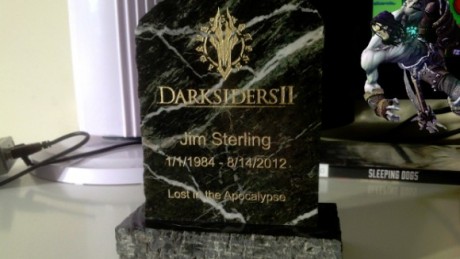
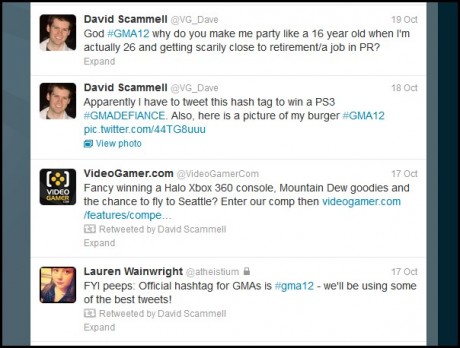
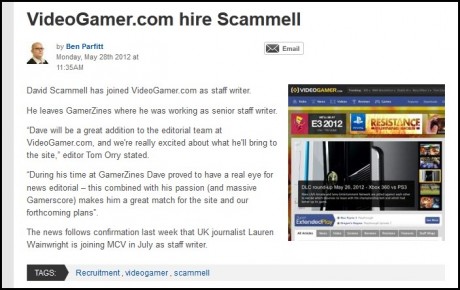

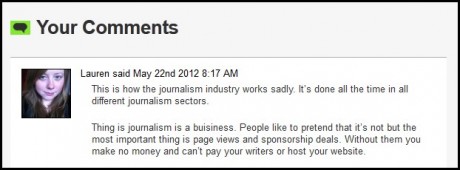






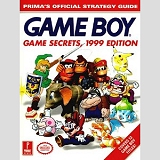


Stu, I think I found the other bit in the LinkedIn profile that Lauren might not have wanted to be public knowledge: she worked as a junior publicist for 4 months at Barrington Harvey, one of the biggies in videogames PR.
Also, I can confirm that Lauren is Dave's boyfriend.
The BH thing is still mentioned on her Journalisted page. Along with certain other information that I'm mindboggled she hasn't deleted.
As can I. Her Facebook profile states it clear.
Blimey Stuart you don't mess around (but then I should already have known that with the Kick Off '96 Review :-).
I'm not surprised at all about not deleting anything else. I bet there's a certain amount of hiding under a duvet and hoping the whole thing blows over.
What else is there to do now?
“Her Facebook profile states it clear.”
Ooh, good work. Adding.
On Lauren, there are a lot of things on her Blog(s) to be retrieved:
For instance I found this rather ironic, as she picks on some guy about his admittedly rather "basic" articles: http://www.laurenwainwright.com/?p=829
Then at some point the guy pops up in the comments section and starts talking about libel and demanding she remove the article, she apparently didn't comply:
This is about her starting on a PR firm for games while apparently working for GameSpot UK on the side: http://www.laurenwainwright.com/?p=414
Stu,
I've hugely admired how you've covered this issue. But a couple of articles ago, you made a direct accusation against IGN's Colin Campbell, an accusation which absolutely none of your peers seem to have wanted to follow up on or even mention. Is there any way you'd be prepared to go into more detail about that?
She's Dave's BOYFRIEND?
Things just got interesting.
“I’ve hugely admired how you’ve covered this issue. But a couple of articles ago, you made a direct accusation against IGN’s Colin Campbell, an accusation which absolutely none of your peers seem to have wanted to follow up on or even mention. Is there any way you’d be prepared to go into more detail about that?”
I imagine nobody’s followed it up because it was a long time ago and it’s my word against his, with no evidence either way. But Colin is the only person in my career who’s ever tried to get me to review a game on the understanding that it had to receive a certain minimum score to keep the publisher happy and taking out adverts. It was Domark’s skanky conversion of Super Space Invaders for the C64. I refused, and Commodore Format, which Colin was editor of at the time, ended up giving it 92%.
(I think Colin may also have been publisher of Amiga Action when it reviewed Rise Of The Robots, but I can’t say for sure – the issue it was in hasn’t been scanned on AMR yet.)
Well, that was brilliant. Regarding that last sentence, though. Do you think it will change? You don't, do you?
.. It won't, will it?
More of this, it's proper and very much appreciated.
I don't like to think I'm being mugged by over-reaching, pandering copy about my favourite hobby. But how best, as a consumer – the intended endpoint for all of this pantomime – to make a difference and somehow curb the ever-ballooning PR dance? I can start questioning everything I read, but I'll never really know for sure.
I respect what Eurogamer has done, given the bigger picture, but I already don't give a shit about previews (much less industry awards) on any games site. In fact I actively avoid them–particularly when so much of it revolves around paid-for hobnobbery like flights, hotel stays and entertainment.
So what to do, as an erstwhile “gullet with a wallet”? I’ve never been comfortable feeling like the target of this kind of backroom puppetry. Is the answer some kind of regulatory body, and if so how do we – both consumers and writers – encourage the industry to co-operate?
Based on her picture and actions, I had assumed she was a secondary school girl doing workplace experience. I didn't realise she was an adult. But then from my experience of games PR types, I don't know many who are, mentally.
Minor point, Intent Media's accounts are published and available from Companies House. They don't look overly healthy: currently heavily in debt. And a debt that's doubled to £3m in the last 12 month reported period.
Good article though.
@RevStu
you mean we were right all this time about why the frankly disappointing Rise of the Robots got such great press?
asdasd – The answer to that question, and the best thing in the article is this.
" games journalists are merely serving the people who pay the bills, and that isn't the readers any more, because they demand all their journalism for free."
People don't buy games writing, so they don't get it. And this means that it's difficult even for people to do for free. I've written unpaid for a few websites in my time (in exchange for promos etc as implied) but I noticeably stopped getting work from one site after I gave a kicking to the truly awful Tony Hawk's Motion on the DS.
(And that's a game with a stonking average of "39" on Metacritic). I was considerably less kind admittedly.
I've been thinking for a while that there are really very few journalists, as the man on the Clapham omnibus would understand the term, in games media. The cosying up to publishers and PR drones precludes the kind of distance a journalist needs to write articles that are, at the very minimum, honest.
Personally I'd say that if you sign an NDA you stop serving the interests of readers and become a PR mouthpiece, but I understand that this is not view shared by many others. The thing that annoys me most is the bleat of "That's how the industry works!" that greats any kind of criticism of games media. You can see Wainwright doing it in that last screenshot. It annoys me because it doesn't *have* to be they way the industry works. If we really wanted, we could stop it all and have decent, thorough, real journalism for games. We could treat them as seriously as we always claim we want to, but we can't just get distracted by the next shiny new game that comes along and forget all this ever happened. Which is what the cynic in me knows will happen.
There's a link to that 92% Super Space Invaders review here:
http://ia600600.us.archive.org/24/items/commodore-format-magazine-16/Commodore_Format_Issue_16_1992_01_text.pdf
People must have really been stuck for entertainment in the old days.
P.
“Minor point, Intent Media’s accounts are published and available from Companies House. They don’t look overly healthy: currently heavily in debt. And a debt that’s doubled to £3m in the last 12 month reported period. Good article though.”
Well, that’s shot MY reputation as an investigative journalist to bits. Care to discuss the matter further via the highly confidential WoSland contact page? (Have ordered the accounts from CH myself.)
Paul: are you sure you've read those accounts correctly? I’m no expert but net assets seem to be up 50% on the previous year, from £1m to £1.5m.
This post is also pretty damning about Lauren:
http://www.rllmukforum.com/index.php?/topic/265873-biglime-and-eurogamer-game-over/page__st__600#entry8916037
is everyone calling themselves bob now?
but I just wanted to leave one thing
https://twitter.com/atheistium/status/261193721016643584
http://i.imgur.com/llxpp.png
Yep net assets are up. That's the valuation of everything they could theoretically sell if they wound up the company. No idea what these would be for a company like intent media, their assets are soft and hard to value, stuff like IP.
Sometimes these can get overstated on balance sheets, sometimes so you can raise debt. No idea what the case is with intent media.
What you need to look at is total liabilities and in particular creditors, what they owe. It's gone up even more to point where the book value of the company (what would be left if they sold their assets, collected money owed and settled their debts) is -1.4m
I've been following this with great interest, and can remember the spot-on savagery of the Amiga Power feature from 1995 which alluded to the whole PR Man On My Shoulder episodes.
While I don't have that Amiga Action issue any more (I used to have it before ceremonially throwing it away in contempt), I do remember the Rise of the Robots review not even trying to hide the fact the reviewer had gone to the programmers base (in Macclesfield, I think) and being in awe as the lovely graphics were showcased.
I have, however, remembered about the link to where AP2 reveals RevStu's letter to the computer games trade in the aftermath of the ROTR reviews. Part Two is probably the most relevant: http://dspace.dial.pipex.com/ap2/comments/Stuart_Campbell/ROTR_letter.html
The sad thing is that was written nearly 18 years ago, and it has only got worse since then.
Lauren hasn't given any games 73%, has she?
It’s remarkable there are game journalists who continue to insist they are not journalists in the vain hope they aren’t held up to higher standards.
It’s equally remarkable they are insistent they could never be in any way influenced by PR’s subtle manipulations. Considering the fact major publishers have dossiers on individual game journalists and considering there’s billions of dollars at stake in next-gen hardware releases, that seems wholly naive and naiveté isn’t really what we should be looking for in journalists of any stripe.
Google cache of a Kotaku link from 2006:
http://webcache.googleusercontent.com/search?q=cache:26-ZlHpc–gJ:http://kotaku.com/209305/sonys-black-book-of-game-journalists-is-painfully-boring+http://kotaku.com/209305/sonys-black-book-of-game-journalists-is-painfully-boring&hl=&ct=clnk
Google “Chris Anderson”, Wired, “Microsoft dossier” to see how the Wired magazine editor-in-chief was left with self-doubt after reading his own dossier. Quote: “This was also, as it happens, the story I wanted–or was it just the story I thought I wanted because I was so effectively spun by Microsoft’s PR machine? The mind reels…”
“What you need to look at is total liabilities and in particular creditors, what they owe. It’s gone up even more to point where the book value of the company (what would be left if they sold their assets, collected money owed and settled their debts) is -1.4m”
Aha. I’m terrible at reading accounts.
"She's Dave's BOYFRIEND?"
You might want to try that one again :D
Surely what you need to look at is cash flow? Debt doesn't matter if they're making money, and assets can be valued weirdly.
I would've thought there'd be some trouble after the Game situation this year, but it's possible it had no impact.
"I think nobody actually pasted the full article since it (her old Blog) was gone, she apparently mainly got into "Gaming Journalism" to get "free stuff", and here are her advices on how to do such: http://web.archive.org/web/20100213090917/http://viera.nu/?p=550"
Ye gods.
"I’d search around for websites that are hiring – you’ll be writing for free and end up buying a lot of your own games to review but every now and then you’ll be sent off to exclusive events or getting goodies in your hands that will make it all worth it."
"You get free stuff for doing stuff for free."
At the time Gertsmann was fired over his Kane & Lynch review, Eidos was still self-publishing; they were not absorbed into Square-Enix until 2009.
"I’ve suffered because I used to be a huge nasty bitch online. I’ve since, learned from my ways but it always comes back to haunt you. It has."
Must have been a very short-term and then quickly forgotten lesson!
How come nobody has pointed out the fact that this Lauren Wainwright lassie is a fucking terrible writer?
Slightly off topic, but I wonder if there were any other incidents like this we haven't heard about or were buried. I remember Paul Rose having one of his columns censored by Future when he wrote a not very flattering account of Phil Harrison's conduct at a concert trying to plug the PS3. Any other warnings from history that didn't quite blow up in public like this that can be discussed?
(Oh and for comedy, Alex "Icycalm" Kriegard using his parents lawyers to shut down the rllmuk thread he was getting schooled in. That was pretty hilarious)
Great articles, Stu. I remember some 8/10 years ago (maybe less), Edge putting out a long piece about the dangerous liaisons between PRs and journalists, but lack of details made that a too generic effort in comparison.
If it's any consolation, the scenario abroad is not so different. During first internet boom I had the venture of working for an Italian startup gaming site.
For sure I was naif (first job, I *wanted* it badly, as writing about games had been a dream for years – told you I was naif). Maybe I was particularly unlucky, too, but the song I heard was not a good one: my articles were often edited and watered down, negative judgements were taken away – especially when they were against some publisher the bosses wanted to keep friendly relationship with: one of their pet titles was Daikatana, go figure! when practically the entire world was trashing it.
One time a (positive) review I wrote appeared with another guy's signature, and so on. Worst of all, they paid less than 20% of what I earned and then went belly up (no surprise there).
I was lucky to find another job and never worked again in the field.
So what on earth can we do to fix the problem? Subscribe to print magazines? When they're full of the same problems, it feels like I'm just supporting this sort of thing.
Bob's Dad… Bob: Because in games journalism it's a completely and totally mute point.
Jomser says:
So what on earth can we do to fix the problem?
Kickstart an indie review site whose revenue comes not from advertising, but from paid up membership. Employ reviewers who have scruples. Ignore the "exclusives" and other pre-release PR related junk, and if necessary buy the game at retail and review it then. Have as little to do with publishers as possible.
I shudder to think how much effort would be involved, but if you want free, independent, honest games reviews the way to do it is to make sure that "the industry" is held at arms length at all times.
Who's in?
I wrote a comment but then rather than post it i deleted it because
none
of this
shit
matters.
Children starving in Africa, right?
This article clearly has an agenda, is biased, and a terrible example of investigative journalism. So many jumping of conclusions and unsubstantiated insinuations it makes my head spin. Almost as if it exists merely so that Stuart can jump on the bandwagon with his very important opinion, of course in-line with popular opinion, but offering nothing of substance.
Clearly the games industry has a problem, but this 'burn the witch' scapegoat bashing of particular people without any actual evidence of corruption is awful and morally wrong.
You mean apart from all the evidence that there is?
Perhaps there is corruption amongst these individuals, but there is no evidence, merely insinuation at best. The whole article oozes cynicism.
Pointing out some ill-conceived or vague tweets, profiles on Linkedin and others, and certain relationships within the industry that could quite feasibly be ethical, is not evidence of corruption i'm afraid.
There is a massive element of perception here, and it seems in this case perception is everything.
Jamie, there's already indisputable evidence of corruption – the moment Wainwright threatened to sue or complained to get that article pulled down she proved herself to be corrupt – an enemy of journalism and an enemy of free speech.
All the rest about her most-probably-corrupt dealings with Square Enix and whoever else can't be proven indisputably, but it doesn't really matter at this point – she's already shown her true colors.
Square Enix had nothing to do with the Gamespot/Kane and Lynch/Gerstmann thing. Maybe check those facts a bit better.
Is there really a "rabid demand for exclusive first looks", though? Like you I have my doubts. I realize that a lot of fans are thirsty for info but I'm pretty sure the majority would prefer waiting a week for some actual reports rather than being spoon fed sugared bullshit.
This whole mess is something that has been sorely needed in this industry for a long time. I hope participants (writers, pr folks and readers alike) stops for a bit and thinks about it. Do we want news and actual journalism or just vapid circle jerking.
You think threatening to sue or complaining is evidence of corruption? 'most-probably-corrupt' dealings? Are you serious?
Burn the witch, burn the witch, burn the witch?
@Flynn, and like-minded people saying the same thing on blogs and forums everywhere, repeatedly:
The corruption in games journalism matters, first, because many of us care about computer games. It's an enormous industry, coming to overshadow traditional entertainment media.
It matters in the second place, because it's only the most crudely blatant form of the general corruption of journalism.
@Lenny
RockPaperShotgun got it right, but that was years of effort from experienced professionals writing about something they loved for free.
@Jamie
Which PR company do you work for?
“You think threatening to sue or complaining is evidence of corruption?”
You think running around the internet deleting or editing or hiding everything you’ve ever said is evidence of innocence? Which of Lauren’s friends are you, by the way?
I don't know Lauren personally, and I'm not just talking about her, but the few individuals who have been named and labelled corrupt.
Never did I claim there was innocence on the part of anyone mentioned, I merely said there is a lack of evidence to be so sure of corruption, and as a result having these unified skapegoats for the whole industry – frankly that is just wrong.
The article is a subjective and a fruitless investigation made to sound like evidence. I'm tired of all these apparent 'journalists', most of the time with no actual journalistic qualifications or experience; uncovering a few linkedIn profiles and public company records that actually illustrate nothing of substance and then placing them into an article with an agenda. That's not journalism, let alone investigative journalism, it's a farce and it's shameful. In my opinion, most people who claim they are games journalists are actually just creative writers – or in Stuart's case jaded cynical hacks. Some people say the games industry is in its infancy and I can only imagine this is a symptom of that.
It's all very human nature and very sad, I actually hope Lauren and co have indeed been corrupt so the inevitable destruction of their careers happens to be just. Evidently there will be good that will come of this – better transparency from publications and so on, I just hope it didn't come at the cost of jobs from people that don't deserve it.
"but the few individuals who have been named and labelled corrupt."
I don't recall Florence's piece labelling anyone corrupt. Indeed, it went out of its way to NOT do that.
You seem to be using a very narrow definition of the term, though. There are more ways to be corrupt than merely taking a straight bribe. Using threats of expensive libel cases to silence someone who's said something demonstrably true just because you don't like it is corrupt all day long. Saying you work for Square Enix on your profile and then editing it to say you’ve never worked for them is corrupt. And we very much DO have evidence of that.
@Jamie
We're not getting at Lauren Wainwright personally. For all we know she's a very nice person, who happened to fall foul of the industry.
What we're saying is that the industry is both CORRUPT and CORRUPTING. Stu has reported on many occasions over the past two decades (and possibly longer, as he's quite old by now) on how the industry operates and how what you may read in the "games media" is not exactly FAIR and BALANCED.
The industry has designed it to be this way. They want uncritical reviews of their products on the internet and in print. They employ PR agencies to make sure that happens. Those PR agencies do their upmost to ensure that positive coverage appears in the print/online media as much as possible.
This is where the corruption starts. If everyone's doing it, it's the norm, then it can't be bad right? If everyone's doing it, it is the norm and hell I've got to pay the rent, it's right, right?
We're not saying that Lauren Wainwright is corrupt. We ARE saying that she's the product of a CORRUPT and CORRUPTING industry that is corrupt and does corrupt.
Ask yourself these questions:
1) Was Rab's article on Eurogamer actually libellous?
2) Would Lauren actually have made those complaints to Eurogamer without serious backing?
3) Are you defending the girl (through some false chivalry), or defending the industry because that's exactly what they want you to do and hung out Lauren in order to do so?
We asked for it so you gave it to us…
Nah…
That is way to boring.
White Knights aside, MCV should really stop this woman from writing the 'recommended' section for a while. Another week, another section where every game covered is previewed by her. All ridiculously positive and in a moment of dumbo judgement, they open with Square Enix's Hitman: Absolution. Glowing praise. Followed by more superlatives for Far Cry and Just Dance: Disney Party for her close friends at Ubisoft, and two really telling pieces about Dragonball Z Kinect and Game Party Champions.
DBZ has been out in the States for a while and is getting absolutely slated – 48 on Metacritic. But its a recommended title here. But…isn't the writer great friends with the PR woman who's promoting this one? She was shown laughing at WoW players with Ms. Wainwright on a video, wasn't she? Oh, yeah…she was.
The Game Party Champions for Wii U piece is amazing. The game is "sure to keep any family entertained during the holiday period." No Game Party title has scored more than 37 on Metacritic so far and I know for a fact that no preview or even final code has been released. Press release regurgitated as a recommendation? That's just low.
How does anyone take MCV seriously any more?
And Ms. Wainwright's friend from Namco is one of this year's '30 under 30.' An honourable mention in that section goes to Dave Cook, who everyone seems to have forgotten about because he gave his PS3 to charity. Even though right after saying he'd do that, he went on a rant about how it wasn't fair and how he didn't understand what he'd done wrong.
Oh and Rupert Loman of Eurogamer is an 'honourable mention' too – but the owners of Ms. Wainwright's boyfriend's site…well….
Whole fucking industry is corrupt.
Publishers aren't throwing goodies/junkets at games reviewers out of the goodness of their hearts: it's because they know that if they throw enough some of it will bear fruit in postive (or, at least, less negative) reviews/features etc.
Btw, Section 1 of the Bribery Act 2010:
1. Offences of bribing another person(1)A person (“P”) is guilty of an offence if either of the following cases applies.
(2)Case 1 is where—
(a)P offers, promises or gives a financial or other advantage to another person, and
(b)P intends the advantage—
(i)to induce a person to perform improperly a relevant function or activity, or
(ii)to reward a person for the improper performance of such a function or activity.
Incidentally, pursuing a libel action in England/Wales isn't necessarily prohibitively expensive for the Claimant.
Costs are certainly huge but, provided the claim is funded by a Conditional Fee Agreement, there is little financial risk to the Claimant personally. The sames does not apply to the Defendant.
“Incidentally, pursuing a libel action in England/Wales isn’t necessarily prohibitively expensive for the Claimant.
Costs are certainly huge but, provided the claim is funded by a Conditional Fee Agreement”
Sure. But no lawyer with an IQ bigger than his shoe size would take Wainwright’s piss-poor case on under a no-win-no-fee arrangement.
Leafing through a 2005 PC Zone the other day, I notice that they used to have a section where they flogged payola items from game publishers for charity.
You're bang on about exclusives.
What sensible people want when they are looking for an opinion, is an opinion they can rely on. Consistency. The understanding that a consumer has to pay money for these titles and can't buy them all. This takes time, but in the end is much more valuable to both reviewer and readership.
In any form of reviewing or advice, people are willing to wait a reasonable length of time for the opinion of those they trust. Sometimes I will watch AVGN review 30 year old games, or Ashens review 4 year old knock off consoles, simply because they've clearly spent time in formulating their opinion. And their opinion is consistent. Perhaps not the best examples, but think about anything else you buy, directions you take, doctor's advice.
And what where talking about here, what is so crucial, is reviews. Not news or previews. You can hype those up to all buggery, it doesn't matter. What matters is when people are spending time and money on something based on your opinion.
Then honesty is the only currency.